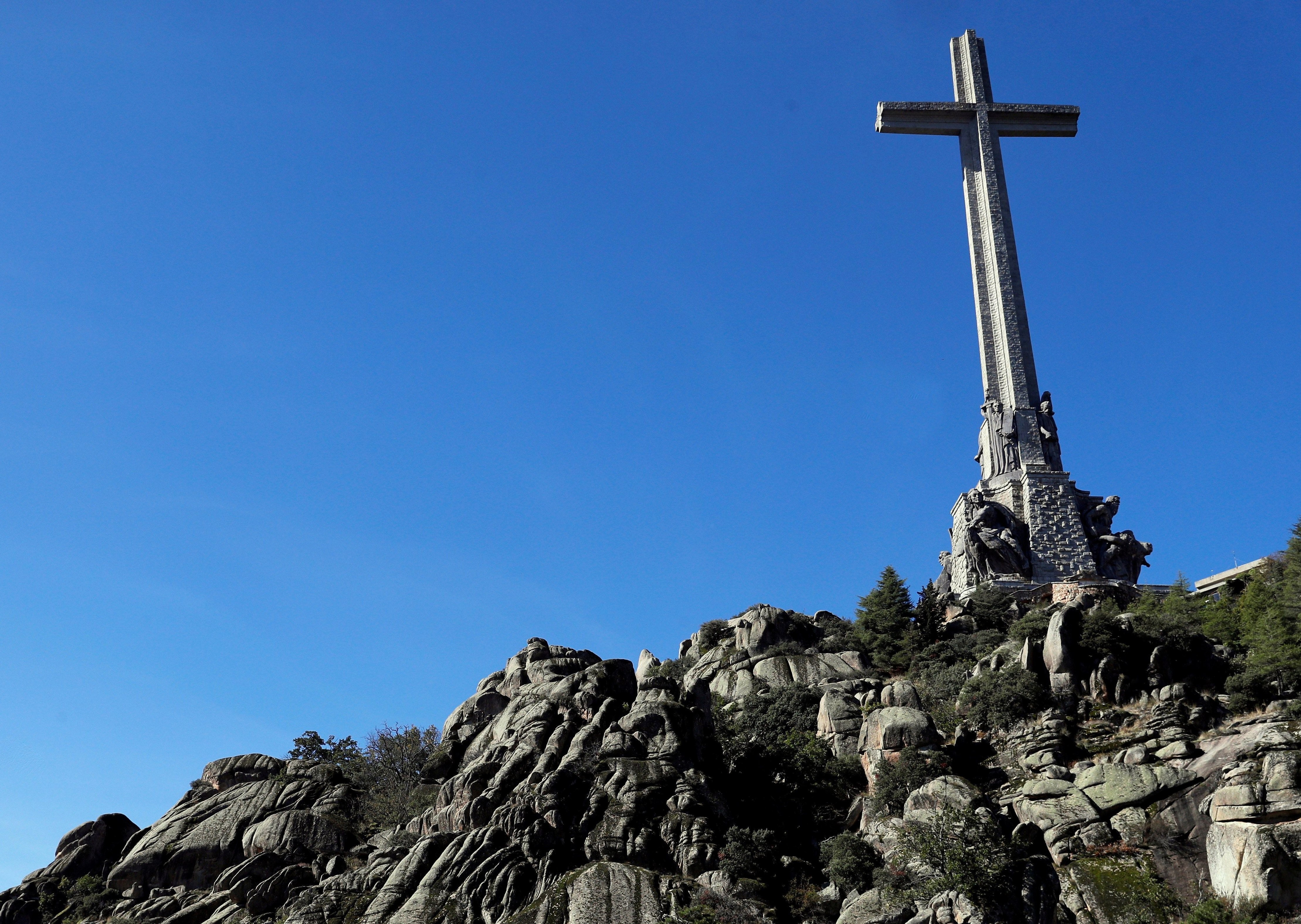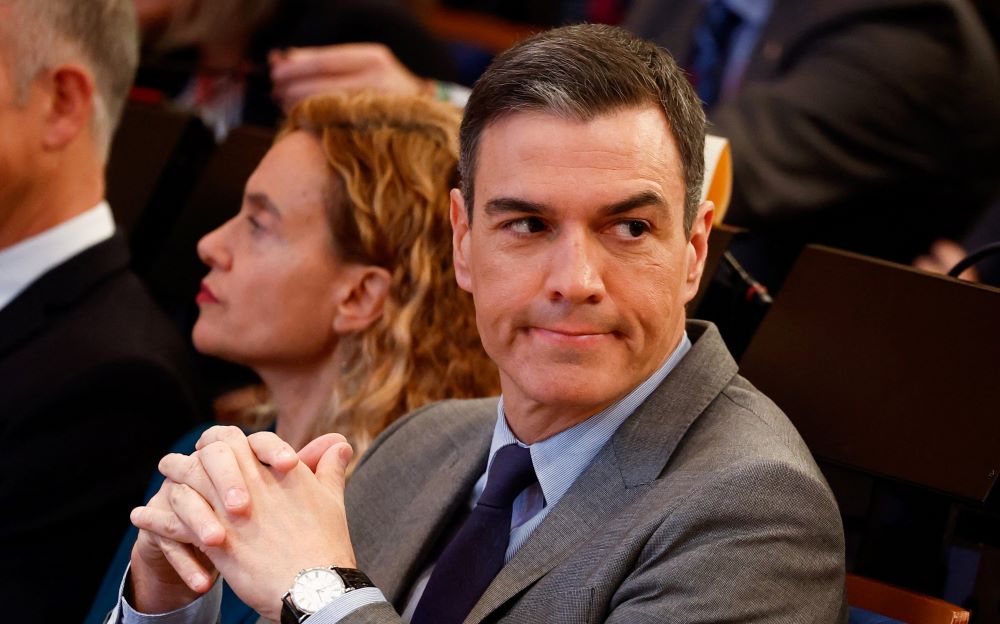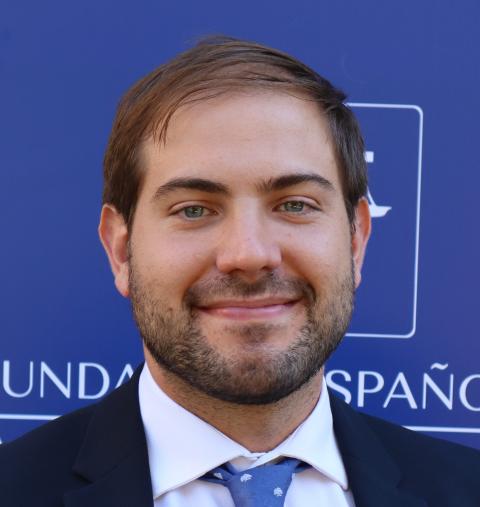
A large cross stands above the mausoleum that formerly housed the tomb of former Spanish dictator Gen. Francisco Franco in this Oct. 24, 2019, file photo. Franco's body was exhumed on that day and was reinterred in Madrid's El Pardo cemetery. A new law is expected to spur demands for the removal of Catholic monuments linked to Franco's 1939-1975 dictatorship. (CNS/Emilio Naranjo, pool via Reuters)
When premier Pedro Sánchez Pérez-Castejón's Socialist-led government celebrated its third anniversary in mid-January, Spain's Catholic bishops marked the event with a 108-page statement, highlighting everything they believed had gone wrong in their country.
On Jan. 25, a machete-wielding Muslim extremist attacked people at two churches (killing one person) at Algeciras in Spain's southern Cádiz-Ceuta Diocese, prompting fresh soul-searching about tensions underlying this traditionally religious society.
And with Sanchez's "progressive coalition" pledging further radical changes, the stage looks set for continuing conflict.
"Relations between the church and current government haven't been easy — there's been disagreement in most areas," said Fran Otero Fandiño, chief editor of the Catholic weekly Alfa y Omega.
"It's the first time in our democratic history that a far-left party has held power, tilting the government into prioritizing a significant ideological agenda," Otero told NCR.

Spanish Prime Minister Pedro Sánchez Pérez-Castejón's attends the 68th Annual Session of the NATO Parliamentary Assembly in Madrid Nov. 21, 2022. Since 2020, his government has moved quickly to enact liberal laws on issues including euthanasia, abortion and transgender identity. (CNS/Reuters/Juan Medina)
When the coalition took office in January 2020, bringing Sanchez's Socialist Worker's Party, or PSOE, together with Podemos, headed by Pablo Iglesias Turrión, its 50-page program made clear it planned to move Spain in a liberal, secularizing direction.
And while church leaders appeared conciliatory, offering "loyal and generous collaboration," many were shocked by the tempo of the coalition's initiatives, which appeared to take Spain ever further from its already eroded Catholic roots.
New laws were pushed through secularizing education and permitting state-funded euthanasia, as well as allowing local councils to remove Catholic symbols from public places.
Although Iglesias, a professed admirer of Italian communism and Venezuela's Hugo Chavez, quit in March 2021, Podemos remains in the coalition and the radical tempo has continued.
An "Organic Law on Sexual and Reproductive Health," passed on Dec. 15 by Spain's Cortes lower house, will allow girls age 16 and up to obtain abortions without informing their parents. It also criminalizes prayers outside abortion clinics and introduces a register of doctors refusing to terminate pregnancies.
A "Law for Real and Effective Equality of Trans Persons and Guaranteeing LGBT Rights," also passed in December, will enable people over 16 to re-register their gender without medical or legal procedures.
Pro-life supporters join in a prayer vigil near a private abortion clinic in Madrid April 2, 2022. The Spanish bishops' conference has criticized a new law that allows girls 16 or older to obtain abortions without parental knowledge or consent and impose fines and disqualifications for objecting medical staff. (CNS/Reuters/Susana Vera)
The measures build on reforms introduced under Spain's previous Socialist-led government in 2004-11, which legalized same-sex marriage and liberalized divorce. Government leaders such as Equality Minister Irene Montero have insisted they will enhance democracy and personal freedom.
However, the conservative opposition Partido Popular and more outspoken Vox party have accused Sanchez's coalition of upturning Spain's system of values, violating the national constitution and international law.
They've also bitterly attacked the governing coalition for pardoning jailed separatists from Spain's restive Catalonia region, and for giving amnesty to convicted members of the outlawed Basque ETA movement.
Meanwhile, warnings have come from Barcelona Cardinal Juan José Omella, the Spanish bishops' conference president, as well as from prominent leaders such as Valencia Cardinal Antonio Cañizares Llovera, a former Vatican prefect, who have accused the government of sidetracking public debate and ignoring expert opinion.
"There's no doubt the coalition's laws have collided head-on with the church's social doctrine," said Otero, the Catholic editor.
"This is why the bishops have criticized them so forcefully as hindering the common good. They see the coalition's agenda as marked by individualism, gender ideology and the absence of God."
A young woman takes part in a procession on the feast of Corpus Christi in Toledo, Spain, June 16, 2022. (CNS/Reuters/Isabel Infantes)
In their Jan. 13 statement, the Catholic bishops urged Spaniards to reflect on the "great transformation" now affecting their society, listing recent moves they said prioritize the "absolute power of the individual," in ways "totally contrary to reason, nature and life."
"Families create society and give birth to political communities — the family links developed throughout history, with their cultural, economic, social, religious and political expressions, allow us to recognize ourselves as a nation," noted the statement, presented to the media by Valladolid Archbishop Luis Javier Argüello García.
"When the family is placed at the center of controversies and ideological polarizations, it becomes almost impossible to share a consensus that recognizes its real and vital value," the prelate said.
The coalition has also sought to reshape public attitudes toward Spain's recent history, particularly the four-decade dictatorship of Gen. Francisco Franco.
Franco's remains were reinterred at Madrid's El Pardo cemetery with church approval in October 2019, after being exhumed from a Benedictine-run pontifical basilica at the Valle de los Caídos, or Valley of the Fallen, a large memorial near the capital to Spain's 1936-39 civil war.
A government-sponsored Democratic Memory Law, enacted in October, will place the site under secular, rather than Catholic, management, noting in its preamble that an improved historical awareness will "strengthen civic virtues and constitutional values."
However, the Valley's Benedictine prior, Fr. Santiago Cantera Montenegro, has vowed to resist moves to expel his community, which has run the memorial since 1958, while an Association to Defend the Valley has also called on church leaders and the Vatican to oppose the changes.

Norberto Dominguez is spokesman and campaigns director for Spain's Association of Christian Lawyers, Abogados Cristianos. (Courtesy of Norberto Dominguez)
While many citizens approve the government's overall intention, some fear bitter historical memories are being reignited, while Spain's Association of Christian Lawyers, Abogados Cristianos, says the new law's ban on monuments deemed to "exalt" Franco will be exploited to demote the country's Christian heritage.
Norberto Dominguez, the association's spokesman and campaigns director, said the government has misled people by constructing a humanitarian narrative around its reforms.
"The coalition is being propped up by minority political forces aggressively opposed to the Catholic Church, who've pressured it to restrict religious freedom as a price for approving its budget and other essential actions," Dominguez told NCR.
"The result, in just three years, has been an extraordinary agenda against the fundamental values and rights of citizens," he said. "Although people are now becoming aware of this, many still haven't realized how far the government's aims extend."
A large statue of Christ is carried during Holy Week celebrations in Málaga, Spain, April 11, 2022. Although 53.7 percent of the country's 47 million inhabitants identify as Catholics, according to new data, fewer than a fifth practice their faith. (CNS/Reuters/Jon Nazca)
Some Catholics think Spain's church needs to change as well.
At a late January congress of pastoral theologians in Madrid, there were calls for a more evangelical, inclusive and fraternal style of ministry, less centered around clerical, patriarchal structures and attitudes.
Although 53.7 percent of the country's 47 million inhabitants still identify as Catholics, according to new data, fewer than a fifth practice their faith, while the church's 22,988 parishes face a clergy shortage and many of its 70 dioceses report having no vocations.
In January, as a Vatican delegation began a two-month apostolic visitation of Catholic seminaries, Spain's Education Ministry claimed that fewer than 60 percent of school students now accepted religious classes, compared to 83 percent two decades ago.
With a vast network of schools, monasteries and charitable institutions at home, and more than 10,000 missionaries working abroad in 136 countries, the church still projects a powerful influence.
A police officer stands guard outside Spanish parliament in Madrid May 21, 2019. In a Jan. 13 statement, Spain's Catholic bishops criticized recent laws they said prioritize the "absolute power of the individual" in ways "totally contrary to reason, nature and life." (CNS/Reuters/Susana Vera)
Yet Sanchez's coalition is also pressing on.
In addition to the laws on abortion and transgender rights, now awaiting Senate approval, a new Ley de Familia, or Family Law, will recognize 16 different family types, and has been enthusiastically championed by Ione Belarra, Spain's 35-year-old social rights minister, as a further step toward diversity and fairness.
Dominguez, the Catholic lawyer, thinks the government coalition will meet its match in upcoming elections — to local councils in May and to the 350-seat Cortes in December, where it holds a tenuous majority of just two seats and is forecast to obtain fewer than a third of national votes.
"If the situation remains unchanged, we can confidently expect a transformation of political power this year," Dominguez said. "For now, though, Catholics everywhere should look with alarm at what's happened — at how a coalition with narrow support can enforce laws which affect everyone and have serious consequences for whole generations."
Advertisement
Otero, the Catholic editor, is more conciliatory.
He also expects the PSOE-Podemos coalition to be voted out of power, but fears it will drive its agenda forward before the elections, calculating its "ideological laws" will remain in place for the foreseeable future.
"Although these laws are contrary to Christian anthropology, I don't think dialogue should ever be rejected," Otero said.
"In the meantime, it's important we, as Catholics, examine our own consciences, ask ourselves why these ideological tendencies have found a place in our society — and what has prevented the Gospel message from reaching so many of our contemporaries," he said.





